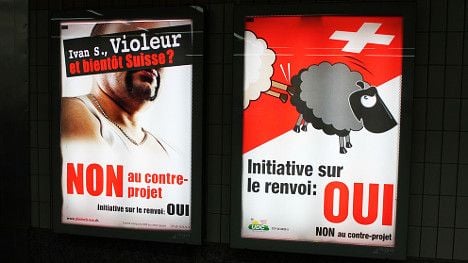With a strident anti-immigration stance and provocative campaigns, the far-right Swiss People’s Party (SVP) has become one of the most successful right-wing populist parties in Europe. It now looks set to repeat its success in October’s federal elections.
For decades, the SVP seemed to be little more than a curiosity in Swiss politics, winning about one in every ten votes in elections. However, since the early 1990s its popularity has rocketed, its share of the vote doubling in 12 years. In the 1995 federal elections, the far-right party got 14.9 percent of the votes. By 2007, its support had risen to 28.9 percent.
“It has become the strongest and most stable extreme-right party in Europe,” says Georg Lutz, director of Swiss Electoral Studies at the Swiss Foundation for Research in Social Sciences in Lausanne.
Today, it’s as strong as ever. The latest poll, published on September 9th and conducted by pollster gsf.berne, showed the SVP way ahead of its opponents, with the support of 28 percent of respondents. The Socialist Party ranked second with 20.5 percent of the vote share, followed by the Free Democratic Party (15.6 percent), the Christian Democratic Party (14.5) and the Greens (9.5).
Like similar parties in other countries, the SVP plays on voters’ fear of change, Lutz argues:
“Globalization, the openness and the enlargement of the European Union, and the increasing amount of immigrants were seen as a cultural threat to Swiss identity for many people.”
The SVP identified those fears and “it became a one-issue party,” always talking about immigration “in different variations,” such as foreign criminals, minarets or the burqa, Lutz tells The Local.
“First, they put the European Union issue on the table; then, when that issue lost its potential due to bilateral agreements, they switched to the question of immigration and foreign criminals,” explains Simon Bornschier, a political researcher who studies the rise of right-wing populist parties in Switzerland and the rest of Europe.
The SVP’s clear and unambiguous message has helped it set the political agenda for the last 15 years, Bornschier says. It has done this partly through Switzerland’s system of popular initiatives – referendums launched as a result of public petitions. Some of the most high-profile recent popular initiatives, such as the minaret ban or the automatic deportation of foreign criminals, were launched by the SVP.
The party’s campaigns have also influenced, or at least closely reflected, voters’ perceptions of reality. According to a poll on citizen’s main concerns published by gfs.berne in September, about 45 percent of the Swiss polled identified immigration as the most important issue in the country. The environment (25 percent) and the economic situation (22) followed far behind.
According to polls, the average SVP voter is a male from a lower socio-economic group who lives in one of the German-speaking cantons.
Strong presence in the media
The SVP’s cause is helped immeasurably by its domination of the Swiss media. According to a study conducted by the Institute for Political Sciences at the University of Bern, the SVP was present in one third of the 8,000 online headlines checked via RSS between late June and mid-September.
The research, lead by political scientist Marc Bühlmann, concluded that the SVP’s success in the media is due to a great extent to its provocative messages. Even when press coverage of the far-right party is negative, they bring the SVP the attention it wants, the study pointed out.
“If you ask journalists in Bern which party press conferences they prefer to attend, they will say the SVP’s because it is more fun,” says Lutz. “The reason is that they are provocative, and they reduce their message to very central elements and frame it and phrase it in a very catchy way.”
Always campaigning
Its success can also been explained by how active the SVP is. “It was probably the first party who moved from a logic of campaigning three months ahead of the elections to be strategically and permanently campaigning,” says Lutz.
The millions of dollars thrown into the hands of the SVP has also helped to spread the views of Christoph Blocher, vice president and party member.
In the 1991 and 1995 elections, the SVP managed to draw together most of the support that other small extreme-right parties had enjoyed before. Today, “these small political groups have almost vanished,” Bornschier tells The Local.
In order to become the dominant far-right party in Swiss administrations, it was necessary to mobilize the party’s grassroots. Today, the SVP has more members than any other party.
“They are very good at organising, they systematically open local branches and their top members go every week to local events to talk to people,” says Lutz.
“What they do is amazing,” he adds.



 Please whitelist us to continue reading.
Please whitelist us to continue reading.
Member comments